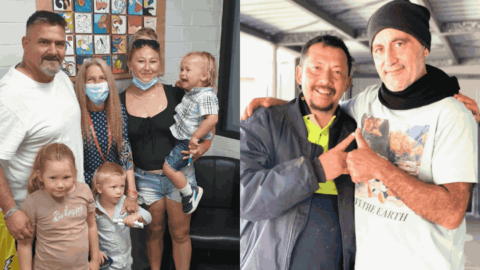Australia Deports Long-Term Residents Over Nonviolent Crimes, Destroying Families

Born in the United Kingdom in 1973, Robert Taylor immigrated to Australia with his parents at them age of 10-months-old.
In fact, having arrived in Western Australia back in 1974, Taylor hasn’t ever set foot outside of that jurisdiction again.
Not ever having become naturalised, Taylor, who turns 50 in April, is, for all intents and purposes, a product of the Western Australian community, having resided there for 49 years and raising his own family, which includes six Australian-born children and nine grandchildren.
Taylor has, however, fallen short of the law in his time. He committed a nonviolent burglary, was sentenced to prison by the state court system and he served his time in a local facility, just like everyone else living long-term in the community does under such circumstances.
Yet, because of the tightened migration character test laws that then immigration minister Scott Morrison oversaw the passing of in late 2014, our nation reserves the right to now deport Taylor for the crime of not having been born here, which is an obvious form of double punishment.
WA advocate and arbitrator Gerry Georgatos is currently acting on behalf of Taylor, who’s being held at Yongah Hill Detention Centre awaiting deportation. And he’s further raising the point that not only is this policy destroying families, but it’s anathema to a morally responsible society.

A classist application
“I’m assisting more than 50 individuals at-risk of deportation: individuals with decades of Australian living, with Australian-born and bred families,” Georgatos told Sydney Criminal Lawyers. “It’s an abomination to tear apart families.”
“The draconian laws discriminate against impoverished people, who’ve often spent most of their lives here,” he continued. “The majority don’t have the capacity to adequately challenge their deportation in the tribunals.”
Georgatos describes the effects the deportation regime has upon the kids of deportees as “harrowing”, and he adds that those sent to foreign countries have often lost ties with them or have never had any in the first place, which is the clear case with Taylor.
The advocate went on to recall a December 2021 tribunal appeal, in which he acted on behalf of Philippines-born man Egwapio “Ian” Orario, who has lived in this country since he was 10 years old and was set to be torn away from his Australian family on being deported.
And despite what Georgatos had been led to expect, the five-hour-long hearing was a success, and Ian is now working fulltime in the community, as well as volunteering within the homelessness sector.
“When is the slate clean? He had completed his court ordered sentence,” Georgatos remarked in relation to Ian’s case. “I had tried to secure him a lawyer, but everyone advised the case could not be won or was unlikely.”
Deporting long-term residents
According to Home Affairs, the visas of over 7,000 “noncitizens” have been cancelled since character grounds amendments to the Migration Act 1958 (Cth) were passed in late 2014. And last October saw 830 onshore immigration detainees, or 63 percent of them, slated for such deportation.
The Morrison-drafted amendments toughened the character grounds test contained in section 501 of the Act, so that automatic visa cancellation occurs on being sentenced to at least 12 months prison, and it also broadened the discretionary powers of the minister to deport under section 116.
“501 has long been a judgmental ideologue, a fest of stigma and at odds with inalienable human rights,” Georgatos said in regard to that section of the Migration Act, and he added that recent years have seen a spike in deportations carried out under section 116.
“In 2014, 501 was altered from the pre-existing migration regime for the propensity to automatic deportation of noncitizens on being sentenced to at least 24 months prison time: a system the United Nations condemned in 2011, as a violation of international human rights law.”
And the escalation in deportations since 2014 has mainly affected the New Zealand-born community, as 2001 laws made the pathway to citizenship difficult for them, while character test reforms captured many, when making it possible to be deported over multiple minor offences.
Necessitated rights reform
NZ PM Jacinda Ardern has repeatedly called on our nation to stop importing its crime issues to her country. And since taking office, Australian prime minister Anthony Albanese has suggested reforming the character test laws so that long-term residents aren’t turfed out.
However, as Georgatos points out, Labor voted in support of these laws when it was in opposition, and while the resulting assault on the New Zealand-born community might not have been apparent then, it was clear that many living in Australia without citizenship were about to be sent packing.
Since the December 2021 victory at the tribunal, Georgatos has been inundated with representation requests from those slated for deportation, and he points to the absurdity of the system that saw him successfully block an attempt to deport a First Nations man, who was born in New Zealand.
“’Immediate past governments were discriminatory with cruelly callous tough on people policies, cultivating hate incitement and nurturing divides instead of contextualising ways forward,” the advocate stressed, “instead of coalescing a diverse human family,”.
“The incumbent government has the opportunity to redeem itself and end the deportations,” he concluded.







